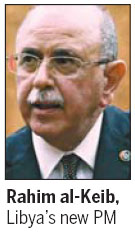Libya's new PM facing huge rebuilding task
 0 Comment(s)
0 Comment(s) Print
Print E-mail
China Daily via Agencies, November 2, 2011
E-mail
China Daily via Agencies, November 2, 2011
Abdel Rahim al-Keib, the man elected on Monday to lead the task of rebuilding Libya after eight months of conflict, is a little known technocrat who won the support of the country's revolutionary council.
|
|
An academic and a wealthy businessman, Keib spent decades abroad as an opponent of Muammar Gaddafi, before quickly joining the revolution that erupted in February and finally triumphed on Oct 20.
His experience as a technocrat, his generous financial support for the National Transitional Council (NTC) and the presentation he delivered to voting NTC members earlier on Monday culminated in his election.
"The main aspects of his program were the stability of the country, of course, the security file and the military file, which will be under the control ... of the interior ministry," said Fathi Baja, the NTC's head of political affairs.
"He also promised to provide for the basic needs of the Libyan people."
Keib won 26 out of 51 votes to become Libya's new prime minister, seeing off four rival candidates, notably interim oil minister Ali Tarhuni and Idriss Abu Fayed, a Gaddafi opponent who was jailed by the former government.
Born in Tripoli in 1950, Keib belongs to a prestigious family from Sabratha, a coastal town 70 kilometers west of the capital.
He trained as an electrical engineer in the United States in the early 1980s, teaching at science faculties there, at Tripoli university and in the United Arab Emirates, where he worked for the state-run Libyan Petroleum Institute.
His profile on the Petroleum Institute's website also lists links with a number of international professional bodies, from the South Korean Institute of Electrical Engineers to the Islamic Development Bank.
In 2005, he founded the International Company for Energy and Technology in Libya.
Shortly after his appointment on Monday, Keib vowed to make human rights his priority.
The new government faces a string of accusations over human rights, including international controversy over the circumstances of Gaddafi's death.






